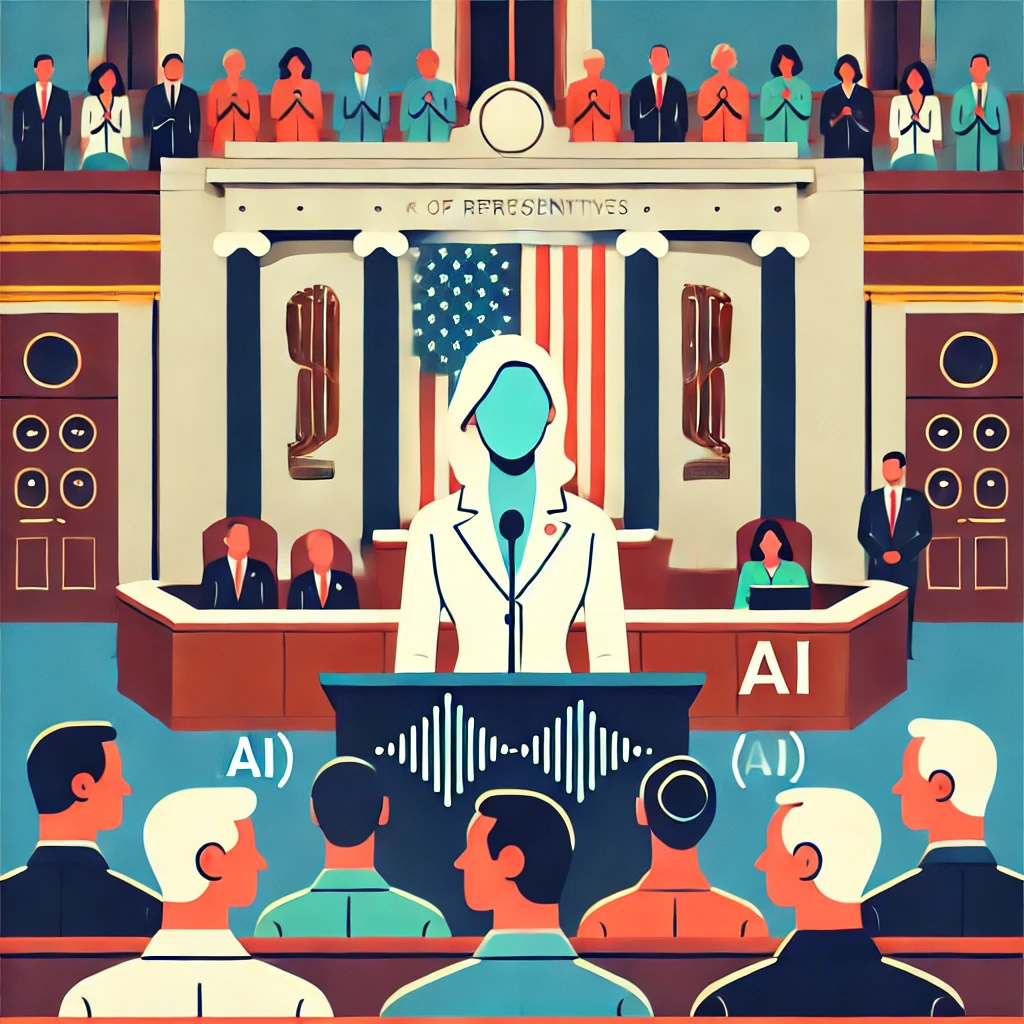Jennifer Wexton is a Congresswoman from Virginia. She used a computer program to talk to other lawmakers. This program is called artificial intelligence, or AI. Jennifer has a condition that makes it hard for her to speak. The AI helped her by making a voice that sounds like hers.
Jennifer is the first person to use AI to talk in Congress. This is a big step for people who have trouble speaking. It shows how computers can help people talk and share ideas. Jennifer’s story might help others who have similar problems. It also makes people think about how we can use technology in new ways.
Original news source: Lawmaker uses AI voice clone to address Congress (BBC)
🎧 Listen:
Slow
Normal
Fast
📖 Vocabulary:
| 1 | Congresswoman | A lady who works in the government |
| 2 | program | A set of instructions for a computer |
| 3 | lawmakers | People who make rules and laws |
| 4 | condition | Something that makes things hard for you |
| 5 | artificial | Not real, made by people |
| 6 | intelligence | Being smart or clever |
| 7 | voice | The sound you make when you talk |
| 8 | step | A move forward or progress |
| 9 | trouble | When something is hard to do |
| 10 | technology | Machines and tools that help us do things |
Group or Classroom Activities
Warm-up Activities:
– CHARADES
Instructions: Students will take turns acting out the main points of the article without speaking. For example, one student can pretend to use a computer or mimic speaking with a voice. The others will guess what they are acting out.
– VOCABULARY PICTIONARY
Instructions: Select key vocabulary words from the article (e.g., Congresswoman, artificial intelligence, voice, technology). Students will draw these words on the board while their classmates guess what they are.
– THINK-PAIR-SHARE
Instructions: Students will think about how technology can help people in their daily lives. They will write down their ideas, then pair up to share their thoughts before sharing with the whole class.
– HEADLINE CREATION
Instructions: Students will work in small groups to create a catchy headline for the article. They will share their headlines with the class and discuss why they chose them.
– OPINION POLL
Instructions: Students will walk around the class and ask their classmates if they think technology, like AI, is helpful for people who have trouble speaking. They will tally the votes and share the results with the class.
🤔 Comprehension Questions:
1. Who is Jennifer Wexton?
2. What did Jennifer use to talk to other lawmakers?
3. What does AI stand for?
4. Why did Jennifer need help from AI?
5. What is special about Jennifer using AI in Congress?
6. How can computers help people like Jennifer?
7. What can Jennifer’s story teach us?
Go to answers ⇩
🎧✍️ Listen and Fill in the Gaps:
Jennifer Wexton is a Congresswoman from Virginia. She used a computer program to talk to (1)______ lawmakers. This program is called (2)______ intelligence, or AI. (3)______ has a condition that makes it hard for her to (4)______. The AI helped her by making a voice that sounds like hers.
Jennifer is the first person to use AI to talk in Congress. This is a big (5)______ for people who have trouble speaking. It shows how computers can (6)______ people talk and share ideas. Jennifer’s story might help others who have (7)______ problems. It also makes people think about how we can use (8)______ in new ways.
Go to answers ⇩
💬 Discussion Questions:
Students can ask a partner these questions, or discuss them as a group.
1. What is your favorite way to talk to your friends?
2. How would you feel if you could not speak?
3. Do you think it is good to use computers to help people talk? Why?
4. What is a computer?
5. Do you like using computers? Why or why not?
6. How would you feel if you could not share your ideas?
7. Do you think everyone should have a way to talk? Why?
8. What is your favorite thing to say?
9. How would you feel if you could use a robot to talk for you?
10. Do you think technology can help people? Why or why not?
11. What is a voice?
12. How do you feel when you hear someone speak?
Individual Activities
📖💭 Vocabulary Meanings:
Match each word to its meaning.
Words:
1. Congresswoman
2. program
3. lawmakers
4. condition
5. artificial
6. intelligence
7. voice
8. step
9. trouble
10. technology
Meanings:
(A) A lady who works in the government
(B) People who make rules and laws
(C) When something is hard to do
(D) Being smart or clever
(E) Something that makes things hard for you
(F) Machines and tools that help us do things
(G) A set of instructions for a computer
(H) The sound you make when you talk
(I) Not real, made by people
(J) A move forward or progress
Go to answers ⇩
🔡 Multiple Choice Questions:
1. Who is Jennifer Wexton?
(a) A teacher
(b) A doctor
(c) A chef
(d) A Congresswoman
2. What does AI stand for?
(a) Artificial Intelligence
(b) Amazing Ideas
(c) Active Internet
(d) Automatic Information
3. What problem does Jennifer have?
(a) She can’t see well
(b) She can’t walk
(c) She has trouble speaking
(d) She can’t hear
4. What did the AI do for Jennifer?
(a) Helped her read books
(b) Made her computer faster
(c) Made a voice that sounds like hers
(d) Taught her how to cook
5. Where did Jennifer use AI to talk?
(a) At school
(b) In Congress
(c) At home
(d) In a park
6. What does Jennifer’s story show?
(a) People don’t need help
(b) Computers can help people talk
(c) Talking is easy for everyone
(d) Computers are not useful
7. Who might be helped by Jennifer’s story?
(a) People who have trouble speaking
(b) People who like to sing
(c) People who play games
(d) People who love to dance
8. What does this article make people think about?
(a) Playing outside
(b) Eating healthy food
(c) Traveling the world
(d) Using technology in new ways
Go to answers ⇩
🕵️ True or False Questions:
1. Jennifer’s story can help other people with the same problem.
2. The story shows how computers cannot help people share ideas.
3. The AI made a voice that sounds like Jennifer’s voice.
4. She used a computer program called AI to help her talk.
5. She has an easy time speaking.
6. Jennifer is the first person to use AI to talk in Congress.
7. Jennifer Wexton is not a Congresswoman from Virginia.
8. This is unimportant for people who have trouble speaking.
Go to answers ⇩
📝 Write a Summary:
Write a summary of this news article in two sentences.
Check your writing now with the best free AI for English writing!
Writing Questions:
Answer the following questions. Write as much as you can for each answer.
Check your answers with our free English writing assistant!
1. Who is Jennifer Wexton?
2. What does AI stand for?
3. Why did Jennifer use a computer program?
4. How did the AI help Jennifer?
5. Why is Jennifer’s story important?
✅ Answers
🤔✅ Comprehension Question Answers:
1. Who is Jennifer Wexton?
Jennifer Wexton is a Congresswoman from Virginia.
2. What did Jennifer use to talk to other lawmakers?
Jennifer used a computer program called AI to talk to other lawmakers.
3. What does AI stand for?
AI stands for artificial intelligence.
4. Why did Jennifer need help from AI?
Jennifer needed help from AI because she has a condition that makes it hard for her to speak.
5. What is special about Jennifer using AI in Congress?
It is special because she is the first person to use AI to talk in Congress.
6. How can computers help people like Jennifer?
Computers can help people like Jennifer talk and share their ideas.
7. What can Jennifer’s story teach us?
Jennifer’s story can teach us how technology can help people with problems like hers.
Go back to questions ⇧
🎧✍️✅ Listen and Fill in the Gaps Answers:
(1) other
(2) artificial
(3) Jennifer
(4) speak
(5) step
(6) help
(7) similar
(8) technology
Go back to questions ⇧
📖💭✅ Vocabulary Meanings Answers:
1. Congresswoman
Answer: (A) A lady who works in the government
2. program
Answer: (G) A set of instructions for a computer
3. lawmakers
Answer: (B) People who make rules and laws
4. condition
Answer: (E) Something that makes things hard for you
5. artificial
Answer: (I) Not real, made by people
6. intelligence
Answer: (D) Being smart or clever
7. voice
Answer: (H) The sound you make when you talk
8. step
Answer: (J) A move forward or progress
9. trouble
Answer: (C) When something is hard to do
10. technology
Answer: (F) Machines and tools that help us do things
Go back to questions ⇧
🔡✅ Multiple Choice Answers:
1. Who is Jennifer Wexton?
Answer: (d) A Congresswoman
2. What does AI stand for?
Answer: (a) Artificial Intelligence
3. What problem does Jennifer have?
Answer: (c) She has trouble speaking
4. What did the AI do for Jennifer?
Answer: (c) Made a voice that sounds like hers
5. Where did Jennifer use AI to talk?
Answer: (b) In Congress
6. What does Jennifer’s story show?
Answer: (b) Computers can help people talk
7. Who might be helped by Jennifer’s story?
Answer: (a) People who have trouble speaking
8. What does this article make people think about?
Answer: (d) Using technology in new ways
Go back to questions ⇧
🕵️✅ True or False Answers:
1. Jennifer’s story can help other people with the same problem. (Answer: True)
2. The story shows how computers cannot help people share ideas. (Answer: False)
3. The AI made a voice that sounds like Jennifer’s voice. (Answer: True)
4. She used a computer program called AI to help her talk. (Answer: True)
5. She has an easy time speaking. (Answer: False)
6. Jennifer is the first person to use AI to talk in Congress. (Answer: True)
7. Jennifer Wexton is not a Congresswoman from Virginia. (Answer: False)
8. This is unimportant for people who have trouble speaking. (Answer: False)
Go back to questions ⇧















